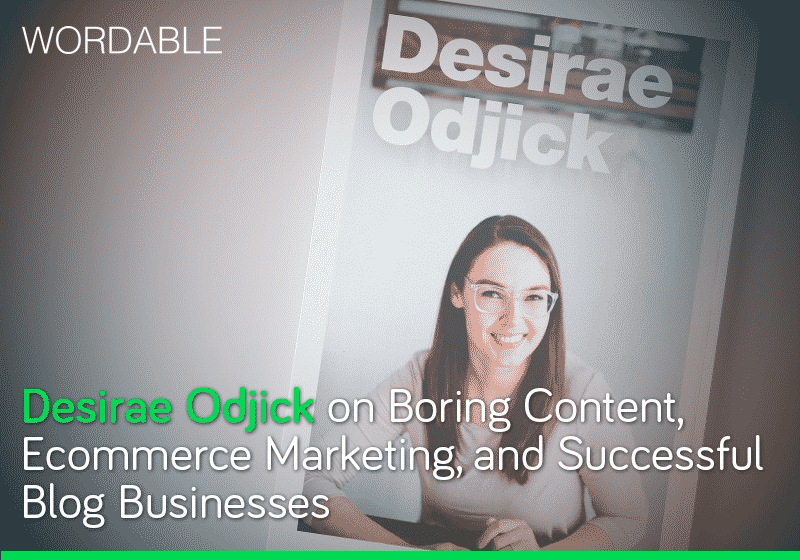
Content Crafters is an interview series where we de-construct the tools, tips, and tactics that top bloggers use to get so much work done. you’ll walk away in mere minutes with actionable takeaways you can try out right away. Let’s dive in!
Desirae Odjick is a content marketing manager at Shopify and the founder of Half Banked, a successful personal finance blog.
Shopify, as you might know, is a wildly successful Canadian SaaS platform that powers ecommerce websites. They’re well known in the marketing world for their outstanding content marketing program, which brings business results but also helps millions of people learn about building ecommerce businesses (note: we’ve interviewed Tommy Walker, former EIC at Shopify Plus, in the past).
Half Banked is a personal finance blog aimed at teaching millenials how to better manage their money.
She’s an excellent content marketer all around, but she’s particularly gifted at and interested in making seemingly-boring topics fun and easy to learn.
When she’s not at Shopify or working on Half Banked, she likes to spend time with her dog, read books, lift (moderately) heavy things, and resist starting new online projects.
You can follow Desirae on Twitter at @desiraeo or on her personal website here.

I always wanted to use my marketing powers for good, not for evil.
Content marketing feels like the best way to do that, because you win most effectively by helping your current and future customers win, too.
If you can make someone better at creating great hairstyles, like Luxy Hair does with their videos, you’re more likely to win their business when they need hair extensions. If you’re the go-to resource on how to build a successful online business, you’re more likely to be a trusted partner when someone is looking to… well, build an online business.
It just feels so much more aligned—I’ve always wanted to be on the same team as the customer, and I think it’s better for business in the long term.
(I also don’t think anyone grows up wanting to trick people into buying things???)
There’s many ways to approach it, from using humour and casual language to including personal stories, but the topics I love to work with are ones that aren’t just boring, they’re mystifying—usually by design, to be quite frank.
There are a lot of industries that have historically done very well by maintaining information asymmetry, and since it was in their best interest, there wasn’t a big push to create materials that people actually wanted to read. Keeping things complicated and hard to understand made sure that when people thought of “reading about insurance,” for example, it sounded boring, or difficult, or both.
One of my favourite pieces to work on, personally, was an article about commercial insurance for the Shopify blog. Doesn’t sound like everyone’s idea of a good time, right?
But when you go in with the intent of making this a simple, approachable guide, you get to phone up experts and your whole job is to ask the questions that many of us would be a bit embarrassed to ask because they seem too basic.
I’m always so excited to help demystify topics that people need to know about, but that have been intentionally complex for so long—and sure, if you’re never going to run a business, commercial insurance is probably not on the top of your most-interesting-reads list.

But if you do run a business, it’s less of a problem that it’s a boring topic, and more of a problem that it’s been kept intentionally confusing for so long that you don’t want to read about it.
Most of the topics we cover at Shopify [like shipping, marketing, sales] are based—in some way—on understanding our audience and how we can serve them.
That’s a huge oversimplification, but it’s built from data from multiple sources over time. I could say it’s intuition, but it’s only intuition because we spend so much time pouring over data to help us understand our audience and how we can help solve their problems.
Writing is clearly the Big Skill that underpins both roles, but I think that specifically, being able to flex different voices in your writing is the biggest thing that’s helped me across both.
When you’re starting your own project, whether you want to eventually monetize it or not, you’re usually going to start from a point of strength and something you’re already comfortable with, whether that’s writing or design or photography. The biggest difference between running your own show and working in a bigger company, though, is that to grow your project, you’re not just doing Your Thing—eventually, you’re going to need to branch out and learn how to do the other roles required to grow. A designer probably knows how to install a font using Typekit on a website, but let me tell you, that’s a (basic) skill I would not have if it wasn’t for my blog.
The other big difference is that you get to be the boss, and have the final say on everything.
You want to send that risky tweet, or decide the pricing strategy for your products or your ad space? That’s all you, and you can wear every hat to get experience doing it.
A big part of the interview process with Shopify was spent talking about exactly that—how I made strategic decisions about my content, and tied the content on my site to revenue, two things I wasn’t in charge of at my day job at the time.
As for Shopify, and working in larger teams, there’s a huge benefit because you get to double down on your strengths, and rely on other team members to be the best at what they do. My past roles were in agencies and B2B companies ranging from 15 to 200 employees, and even in the larger companies, I was still writing the tweets while running the marketing technology stack and the PR and events calendar for the year.
Now I have the privilege of working with a team who are all world-class at what they do, from marketing automation to social media strategy—so for the first time, I no longer write the tweets.
There’s a really great dog kennel just outside of Ottawa, and whenever we bring our dog there to board while we travel, I semi-seriously consider leaving the internet behind and just caring for dogs all day. I feel like a lot of people I know have some version of the “I’d live on a farm and just be with dogs all day” dream, and it’s very much mine.
Or maybe I’d start a dog blog.

It sounds too simple, but actually wanting to improve is one of the biggest differentiators I’ve seen, especially among bloggers, but it could truly apply to any skill. It takes a lot of time and dedication to Do The Work of improving, and after the initial push that it takes to get to “good,” it takes a lot more nuanced, focused work to get to “great” when it comes to writing.
Here’s an example, because that’s a pretty vague sentiment.
Over the past year, I’ve had the opportunity to work directly with Greg Ciotti, my lead at Shopify, as my editor, and it’s really levelled up my writing skills.
Every draft I get back has, let’s be honest, a fair number of edits, but for each one I take the time to go through, slowly accept the edits and understand why the change was suggested (and as Greg would probably tell you, push back when I don’t agree with his suggestions).
I recently had the opportunity to work on a refresh of one of the first posts I wrote at Shopify, and I was able to really tighten up the writing based on where I am now versus a year ago.
I really credit working with an exceptional editor for that improvement, but I’d be lying if I said sitting down to really absorb that level of feedback wasn’t sometimes a challenge. It’s something that, all things considered, you could easily gloss over if you weren’t really motivated to improve, or open to the opportunity to learn.
It’s truly about problem-solving for me—when I’m stuck on a topic, or feeling bored, I think about the problems my audience is struggling with, and that’s what gets me creatively excited for my work.
Hi! It’s your editor again. This section is for those who want to dive deeper on individual points. I’ll expand here on some of the answers above and give you more details on any tools, processes, or resources that were mentioned in the interview.
As Desirae mentioned, many so-called “boring” topics are only that way to intentionally obfuscate the information being transmitted. Sometimes, though, it’s because the industry, in general, doesn’t know how to frame the information in an interesting way. It’s difficult to stand out from the mold, regardless of the environment you operate in, so content that is boring stays boring.
However, you can usually frame things in a more interesting way, or at least a more clear and helpful way. As Desirae said, even commercial insurance can be interesting to those who are running businesses and struggling with the concept.
It’d be tough to cover everything about making “boring” content work here, but I suggest you read this article from Ryan Farley if you think your industry is boring and hard to write content for.
When asked about the difference between mediocre and great content marketers, Desirae walks about the desire to improve as well as the ability to work with great editors. She credits her own lead at Shopify, Greg Ciotti, with leveling up her skills.
This is one of the fastest tracks to excellence in any field, but especially in writing and marketing.
In my own career, it wasn’t until I worked with an editor who truly cared about the content, had domain expertise in our field, and was honest enough with his feedback, that I really improved in my writing. Feedback is the breakfast of champions, as they say, and if you can get rapid, consistent, and valuable feedback from a master editor, you’ll expedite the path to greatness.
I barely even read content in the marketing, SEO, blogging, social media spheres anymore (just the really good stuff). I try to diversify my influences, and I mostly read really good long form journalism, like what you’d get on The Atlantic, FiveThirtyEight, or The New York Times.
And even for books, I try to read non-marketing material – biographies, novels, etc.
Sometimes, in our good natured pursuit to constantly improve, we put ourselves into an echo chamber. We think that if we’re not reading anything and everything in our industry that we’ll fall behind. This simply isn’t true, and giving yourself some space to think, and to gather outside influences, will give you a super power that is hard to replicate.
So as Desirae advises, read world class content and analyze why it works so well, even if (and maybe especially if) it’s outside your niche.
I saved 3 hours uploading this post from Google Docs to WordPress using Wordable.